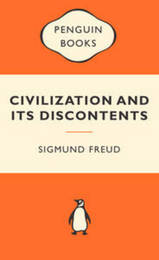
|
Civilization and Its Discontents: Popular Penguins
Paperback / softback
Main Details
| Title |
Civilization and Its Discontents: Popular Penguins
|
| Authors and Contributors |
By (author) Sigmund Freud
|
| Physical Properties |
| Format:Paperback / softback | | Pages:104 | | Dimensions(mm): Height 179,Width 111 |
|
| ISBN/Barcode |
9780141194981
|
| Audience | | General | | Professional & Vocational | |
|---|
|
Publishing Details |
| Publisher |
Penguin Books Ltd
|
| Imprint |
Penguin Books Ltd
|
| Publication Date |
28 June 2010 |
| Publication Country |
United Kingdom
|
Description
In his final years, Freud devoted most of his energies to a series of highly ambitious works on the broadest issues of religion and society. Here, he argues that civilized values - and the impossible ideals of Christianity - inevitably distort our natural aggression and impose a terrible burden of guilt.
Author Biography
Date- 2004-09-22 Sigmund Freud (1856-1939) was born in Moravia; between the ages of four and eighty-two his home was in Vienna- in 1938 Hitler's invasion of Austria forced him to seek asylum in London, where he died in the following year. His career began with several years of brilliant work on the anatomy and physiology of the nervous system. He was almost thirty when, after a period of study under Charcot in Paris, his interests first turned to psychology, and another ten years of clinical work in Vienna (at first in collaboration with Breuer, an older colleague) saw the birth of his creation, psychoanalysis. Freud's life was uneventful, but his ideas have shaped not only many specialist disciplines, but the whole intellectual climate of the twentieth century. Sigmund Freud was born in 1856 in Moravia; between the ages of four and eighty-two his home was in Vienna- in 1938 Hitler's invasion of Austria forced him to seek asylum in London, where he died in the following year. His career began with several years of brilliant work on the anatomy and physiology of the nervous system. He was almost thirty when, after a period of study under Charcot in Paris, his interests first turned to psychology, and another ten years of clinical work in Vienna (at first in collaboration with Breuer, an older colleague) saw the birth of his creation, psychoanalysis. This began simply as a method of treating neurotic patients by investigating their minds, but it quickly grew into an accumulation of knowledge about the workings of the mind in general, whether sick or healthy. Freud was thus able to demonstrate the normal development of the sexual instinct in childhood and, largely on the basis of an examination of dreams, arrived at his fundamental discovery of the unconscious forces that influence our everyday thoughts and actions. Freud's life was uneventful, but his ideas have shaped not only many specialist disciplines, but the whole intellectual climate of the last half-century.
|